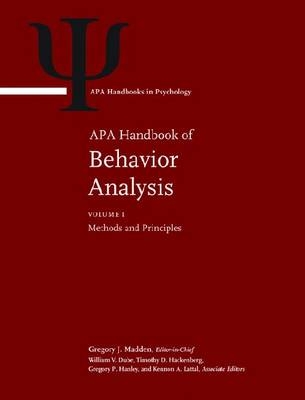
APA Handbook of Behavior Analysis
American Psychological Association
978-1-4338-1111-1 (ISBN)
Behavior analysis emerged from the nonhuman laboratories of B. F. Skinner, Fred Keller, Nate Schoenfeld, Murray Sidman, James Dinsmoor, Richard Herrnstein, Nate Azrin, and others who pioneered experimental preparations designed to do one thing — find orderly relations between environment and behavior. This bottom-up approach to a natural science of behavior yielded a set of behavioral principles that proved orderly and replicable across subjects, laboratories, and species.
By the 1960s, behavior analysts began translating these principles into interventions for institutionalized humans characterized by impoverished repertoires of adaptive behavior. When these interventions proved successful in replacing problem- with adaptive-behavior, the field of Applied Behavior Analysis was born.
Over the last 50 years the field of behavior analysis has grown substantially both in the number of practicing behavior analysts and the range of behavior to which behavioral principles have been applied. Today the laboratory study of basic principles of behavior continues to expand our understanding of behavior and to inform the treatment of disorders ranging from autism to substance abuse.
The present volumes continue this inductive translational approach to the science of behavior analysis by providing overview and in-depth chapters spanning the breadth of behavior analysis.
Volume I provides comprehensive coverage of the logic, clinical utility, and methods of single-case research designs. Chapters walk the reader through the design, data collection, and data analysis phases and are appropriate for students, researchers, and clinicians concerned with best practice. Volume I also provides an overview of the experimental analysis of behavior, and chapters reviewing some of the most important areas of contemporary laboratory research in behavior analysis. Topics covered include memory, attention, choice, behavioral neuroscience, and behavioral pharmacology.
Volume II includes 10 chapters illustrating how principles of behavior discovered in basic-science laboratories have provided insights on socially important human behavior ranging from the complex discriminations that underlie human language to disorders treated by clinical psychologists. The second section of Volume II includes 12 chapters, each devoted to a particular behavioral/developmental disorder (e.g., behavioral treatments of ADHD, autism) or to behavior of societal importance (e.g., effective college teaching, effective treatment of substance abuse). Each of these chapters provides a review of what works and where additional research is needed.
Gregory J. Madden, PhD, is a professor in the department of psychology at Utah State University, Logan. He earned a master's degree in behavior analysis from the University of North Texas is 1992 and a doctorate in psychology from West Virginia University in 1995. After completing a 3-year National Institutes of Health-funded postdoctoral research fellowship at the University of Vermont, Dr. Madden held faculty appointments at the University of Wisconsin–Eau Claire and the University of Kansas before joining the faculty at Utah State University. Dr. Madden's research falls under the umbrella of behavioral economics, with an emphasis on impulsive choice and health decision making. He is the author or coauthor of many of the seminal scientific articles in the study of delayed-reward discounting and its relation to addictions. His research in this area is supported by grants from the National Institutes of Health (National Institute on Drug Abuse). He also holds grants from the U.S. Department of Agriculture. The latter grants support behavioral economic approaches to influencing dietary choices made by children in school cafeterias. Dr. Madden coedited, with Warren K. Bickel, Impulsivity: The Behavioral and Neurological Science of Discounting (APA) and currently serves as the editor of the Journal of the Experimental Analysis of Behavior, established in 1958 and the flagship journal of basic research in behavior analysis. Dr. Madden has served on a number of important decision-making bodies (e.g., the Executive Council of the Association for Behavior Analysis International) and is the recipient of several teaching honors, including being selected as the 2011 G. Stanley Hall lecturer for APA Division 2 (Society for the Teaching of Psychology).
Volume 1: Methods and PrinciplesEditorial Board
About the Editor-in-Chief
Contributors
Foreword
Series Preface
Introduction
I. Overview
Single-Case Research Methods: An Overview
Iver H. Iversen
The Five Pillars of the Experimental Analysis of Behavior
Kennon A. Lattal
Translational Research in Behavior Analysis
William V. Dube
Applied Behavior Analysis
Dorothea C. Lerman, Brian A. Iwata, and Gregory P. Hanley
II. Single-Case Research Designs
Single-Case Experimental Designs
Michael Perone and Daniel E. Hursh
Observation and Measurement in Behavior Analysis
Raymond G. Miltenberger and Timothy M. Weil
Generality and Generalization of Research Findings
Marc N. Branch and Henry S. Pennypacker
Single-Case Research Designs and the Scientist-Practitioner Ideal in Applied Psychology
Neville M. Blampied
Visual Analysis in Single-Case Research
Jason C. Bourret and Cynthia J. Pietras
Quantitative Description of Environment–Behavior Relations
Jesse Dallery and Paul L. Soto
Time-Series Statistical Analysis of Single-Case Data
Jeffrey J. Borckardt, Michael R. Nash, Wendy Balliet, Sarah Galloway, and Alok Madan
New Methods for Sequential Behavior Analysis
Peter C. M. Molenaar and Tamara Goode
III. The Experimental Analysis of Behavior
Pavlovian Conditioning
K. Matthew Lattal
The Allocation of Operant Behavior
Randolph C. Grace and Andrew D. Hucks
Behavioral Neuroscience
David W. Schaal
Stimulus Control and Stimulus Class Formation
Peter J. Urcuioli
Attention and Conditioned Reinforcement
Timothy A. Shahan
Remembering and Forgetting
K. Geoffrey White
The Logic and Illogic of Human Reasoning
Edmund Fantino and Stephanie Stolarz-Fantino
Self-Control and Altruism
Matthew L. Locey, Bryan A. Jones, and Howard Rachlin
Behavior in Relation to Aversive Events: Punishment and Negative Reinforcement
Philip N. Hineline and Jesús Rosales-Ruiz
Operant Variability
Allen Neuringer and Greg Jensen
Behavioral Pharmacology
Gail Winger and James H. Woods
Volume 2: Translating Principles Into PracticeEditorial Board
I. Translational Research in Behavior Analysis
From Behavioral Research to Clinical Therapy
Paul M. Guinther and Michael J. Dougher
Translational Applied Behavior Analysis and Neuroscience
Travis Thompson
Arranging Reinforcement Contingencies in Applied Settings: Fundamentals and Implications of Recent Basic and Applied Research
Iser G. DeLeon, Christopher E. Bullock, and A. Charles Catania
Operant Extinction: Elimination and Generation of Behavior
Kennon A. Lattal, Claire St. Peter, and Rogelio Escobar
Response Strength and Persistence
John A. Nevin and David P. Wacker
Simple and Complex Discrimination Learning
William J. McIlvane
Translational Applications of Quantitative Choice Models
Eric A. Jacobs, John C. Borrero, and Timothy R. Vollmer
The Translational Utility of Behavioral Economics: The Experimental Analysis of Consumption and Choice
Steven R. Hursh, Gregory J. Madden, Ralph Spiga, Iser G. DeLeon, and Monica T. Francisco
Environmental Health and Behavior Analysis: Contributions and Interactions
M. Christopher Newland
Toward Prosocial Behavior and Environments: Behavioral and Cultural Contingencies in a Public Health Framework
Anthony Biglan and Sigrid S. Glenn
II. Applied/Clinical Issues
Behavioral Approaches to Treatment of Intellectual and Developmental Disabilities
Patricia F. Kurtz and Michael A. Lind
Behavioral Approaches to the Treatment of Autism
William H. Ahearn and Jeffrey H. Tiger
The Analysis of Verbal Behavior and Its Therapeutic Applications
James E. Carr and Caio F. Miguel
Assessment and Treatment of Severe Problem Behavior
Louis P. Hagopian, Claudia L. Dozier, Griffin W. Rooker, and Brooke A. Jones
Understanding and Treating Attention-Deficit/Hyperactivity Disorder
Nancy A. Neef, Christopher J. Perrin, and Gregory J. Madden
Teaching Reading
Edward J. Daly III and Sara Kupzyk
Sleep: A Behavioral Account
Neville M. Blampied and Richard R. Bootzin
Acceptance and Commitment Therapy: Applying an Iterative Translational Research Strategy in Behavior Analysis
Michael E. Levin, Steven C. Hayes, and Roger Vilardaga
Voucher-Based Contingency Management in the Treatment of Substance Use Disorders
Stephen T. Higgins, Sarah H. Heil, and Stacey C. Sigmon
Behavioral Approaches to Business and Industrial Problems: Organizational Behavior Management
William B. Abernathy
Contributions of Behavior Analysis to Higher Education
Dan Bernstein and Philip N. Chase
Behavioral Gerontology
Jane Turner and R. Mark Mathews
Index
| Reihe/Serie | APA Handbooks in Psychology® Series |
|---|---|
| Verlagsort | Washington DC |
| Sprache | englisch |
| Maße | 216 x 279 mm |
| Themenwelt | Schulbuch / Wörterbuch ► Lexikon / Chroniken |
| Geisteswissenschaften ► Psychologie ► Test in der Psychologie | |
| Geisteswissenschaften ► Psychologie ► Verhaltenstherapie | |
| ISBN-10 | 1-4338-1111-1 / 1433811111 |
| ISBN-13 | 978-1-4338-1111-1 / 9781433811111 |
| Zustand | Neuware |
| Haben Sie eine Frage zum Produkt? |
aus dem Bereich
